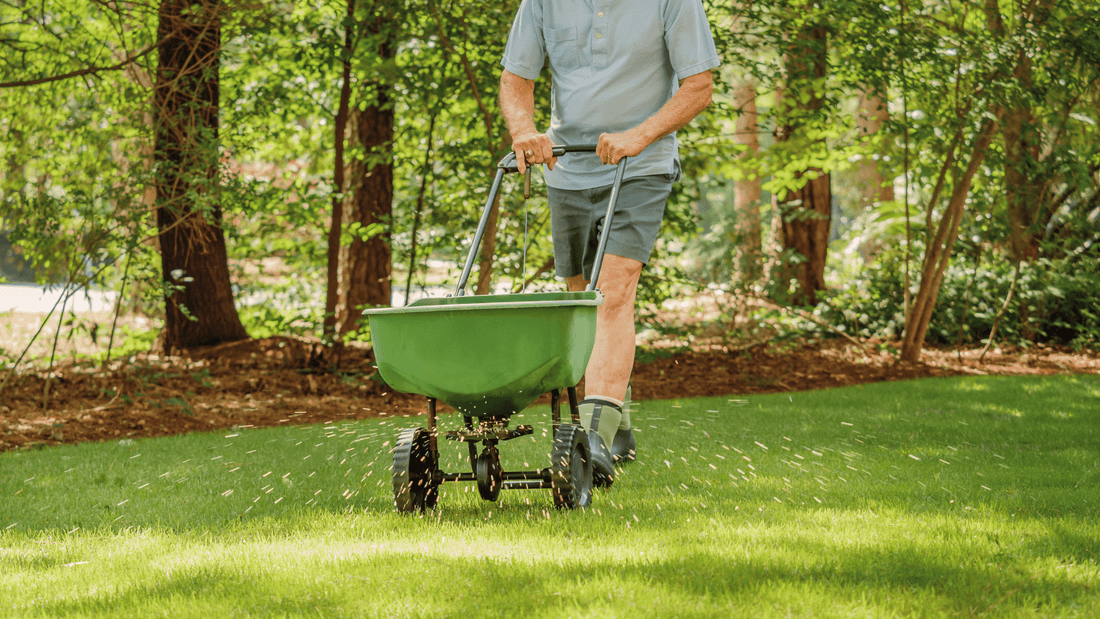Like a garden hoe, rake, and pruning shears, fertilizer is yet another tool in your arsenal you can use to help your garden flourish. However, if you don't use it properly, you won't get the desired results and may even damage your plants unnecessarily. Because getting your garden's fertilizer right is so important, we put together this easy-to-follow guide to help demystify this crucial tool and show you how to use it to your advantage!
Why is Fertilizer Important for My Keswick Garden?
All plants need specific nutrients to grow, and fertilizer is a way to provide those nutrients to your garden in a specific, targeted way. The nutrients in fertilizer can boost a plant's foliage, health, strength, crop yield, floral blooms, and disease resistance. They can also make up for any soil deficiencies your garden may have, quickly and conveniently providing your plants with the nutrients they need to thrive.

Understanding N-P-K
If you look closely at a fertilizer package, you'll notice a ratio of three numbers prominently displayed on the front, like 10-10-10 or 2-14-0. These numbers represent the ratio of Nitrogen (N), Phosphorus (P), and Potassium (K) that specific fertilizer possesses. These elements are the foundational nutrients needed for plant growth, but each has a different role: nitrogen boosts leaf and foliage growth, phosphorus improves root growth and flower production, and potassium encourages disease resistance and overall health. Understanding the ratios of these three nutrients is critical for selecting the right fertilizer for your garden's unique needs and goals.
How to Choose the Right Fertilizer
Choosing the right fertilizer ultimately comes down to its nutrient ratio. If you choose a fertilizer with an incorrect nutrient profile for your specific plants' needs, you likely won't get the results you want. For example, if you use a high-nitrogen, low-phosphorus fertilizer for your tomatoes, you'll have abundant tomato leaves but not much fruit. Understanding the N-P-K ratio on the front of the fertilizer package can help guide your decision, but you'll ultimately get the best results by selecting fertilizers intended for specific plants. For example, you can find products designed specifically for annuals, perennials, fruit trees, berry bushes, vegetables, houseplants, grass, and many more plant varieties. The best practice is to read the label and follow the instructions.

When to Fertilize Your Ontario Garden
Imagine if you ate an energy bar and a high-calorie meal right before bed. Chances are you wouldn't sleep very well as a result and would likely stay awake later than you intended. Similarly, fertilizing plants in the autumn can disrupt their natural rhythms as they prepare for dormancy. Instead, you're better off fertilizing in the spring, as this is when your plants will naturally kick their growth into high gear. Depending on the frequency required for some plants, like vegetables, you can also fertilize again during the summer. When September rolls around, it's best to hold off on the fertilizer and let the plants wind down for winter.
Keep in mind that applying more fertilizer, or fertilizing frequently, is not necessarily better. Make sure to hit the sweet spot by researching the needs of your specific plants, or feel free to ask our in-store experts!
When to Fertilize Your Yard
The best time to fertilize grass is also in the spring, just after the fresh blades have burst through the soil and your lawn is beginning to turn a luxuriant shade of green. To give your grass another boost of nutrients, you can fertilize it a second time in the summer. However, the choice is yours based on how your grass is doing. Remember to water after you apply fertilizer to prevent your grass from burning.

Fertilizer Vs. Compost
Fertilizers are targeted nutrients that boost a plant's growth quickly and precisely. On the other hand, compost and its close relative, manure, is also full of nutrients but not in a purified form. Instead, their nutrients are bound together in a rich melange of decaying plant matter, fungi, and microbes. All of this good stuff enriches your soil, which in turn enriches your plants. In short, fertilizer feeds the plants, while compost and manure feed the soil.
With numbers, ratios, and chemical formulas, fertilizer packages can sometimes be daunting. But once you know what it all means, choosing the right kind for your plants is easy. Just remember to do your research and follow your chosen product's instructions, and you'll be fine! If you still have any questions, stop by our Garden Centre today and let our experts become your fertilizer guides, helping you find the perfect product for your garden's unique needs. We can't wait to see you!




